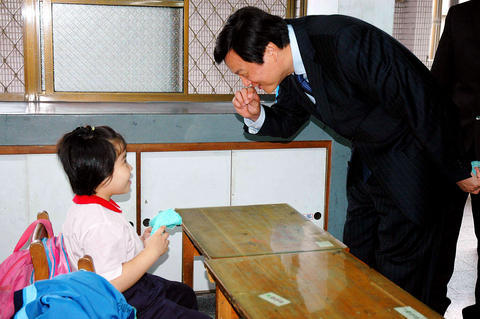The Chinese Nationalist Party (KMT) caucus slammed the Centers for Disease Control (CDC) yesterday, accusing the organization of failing to react sooner to a nationwide outbreak of conjunctivitis.
At a press conference in the legislature, KMT Legislator Hsieh Kuo-liang (
"At the very beginning of the outbreak, the DOH and the CDC regarded the cases as regular conjunctivitis and it never occurred to them that other kinds of bacteria could have been responsible. Therefore, they did not take the outbreak seriously," Hsieh said.

PHOTO: CNA
Hsieh said the outbreak first hit Keelung and Yunlin on Oct. 4, but the CDC did not collect samples from patients to determine the cause of the condition until Oct. 8 although several thousand pinkeye cases had been reported.
The CDC confirmed on Thursday that Coxackievirus type 24, an enterovirus, was responsible.
"A CDC official told me in private that Coxackievirus type 24 once infected 40 percent of the residents of a town abroad. That is to say, the virus has the ability to infect up to 40 percent [of a population]," Hsieh said, asking if a similar situation could occur in Taiwan.
"[The DOH and CDC] completely ignored the possible serious consequences of such an acute disease," Hsieh said, adding that the conjunctivitis outbreak has spread to Taipei and Kaohsiung.
Steve Kuo (
Kuo said that Coxackievirus type 24 contributed to a similar outbreak in Central and South America between August and October 2003, during which time hundreds of thousands of people were infected, although the infection rarely caused serious health problems.
Kuo said 10,510 students nationwide had been infected with the disease as of Friday with cases concentrated in Keelung, Yunlin, Taipei, Kaohsiung and Chiayi.
"What is alarming is that the outbreak implies that people in the country still have poor health habits," Kuo said.
Starting yesterday for three weeks, Taipei City schools must report cases of pinkeye to help track the outbreak, a city government education official said yesterday.
Department of Education Director Wu Ching-chi (
Additional reporting by CNA

The manufacture of the remaining 28 M1A2T Abrams tanks Taiwan purchased from the US has recently been completed, and they are expected to be delivered within the next one to two months, a source said yesterday. The Ministry of National Defense is arranging cargo ships to transport the tanks to Taiwan as soon as possible, said the source, who is familiar with the matter. The estimated arrival time ranges from late this month to early next month, the source said. The 28 Abrams tanks make up the third and final batch of a total of 108 tanks, valued at about NT$40.5 billion

Two Taiwanese prosecutors were questioned by Chinese security personnel at their hotel during a trip to China’s Henan Province this month, the Mainland Affairs Council (MAC) said yesterday. The officers had personal information on the prosecutors, including “when they were assigned to their posts, their work locations and job titles,” MAC Deputy Minister and spokesman Liang Wen-chieh (梁文傑) said. On top of asking about their agencies and positions, the officers also questioned the prosecutors about the Cross-Strait Joint Crime-Fighting and Judicial Mutual Assistance Agreement, a pact that serves as the framework for Taiwan-China cooperation on combating crime and providing judicial assistance, Liang

A group from the Taiwanese Designers in Australia association yesterday represented Taiwan at the Midsumma Pride March in Melbourne. The march, held in the St. Kilda suburb, is the city’s largest LGBTQIA+ parade and the flagship event of the annual Midsumma Festival. It attracted more than 45,000 spectators who supported the 400 groups and 10,000 marchers that participated this year, the association said. Taiwanese Designers said they organized a team to march for Taiwan this year, joining politicians, government agencies, professionals and community organizations in showing support for LGBTQIA+ people and diverse communities. As the first country in Asia to legalize same-sex

MOTIVES QUESTIONED The PLA considers Xi’s policies toward Taiwan to be driven by personal considerations rather than military assessment, the Epoch Times reports Chinese President Xi Jinping’s (習近平) latest purge of the Chinese People’s Liberation Army (PLA) leadership might have been prompted by the military’s opposition to plans of invading Taiwan, the Epoch Times said. The Chinese military opposes waging war against Taiwan by a large consensus, putting it at odds with Xi’s vision, the Falun Gong-affiliated daily said in a report on Thursday, citing anonymous sources with insight into the PLA’s inner workings. The opposition is not the opinion of a few generals, but a widely shared view among the PLA cadre, the Epoch Times cited them as saying. “Chinese forces know full well that